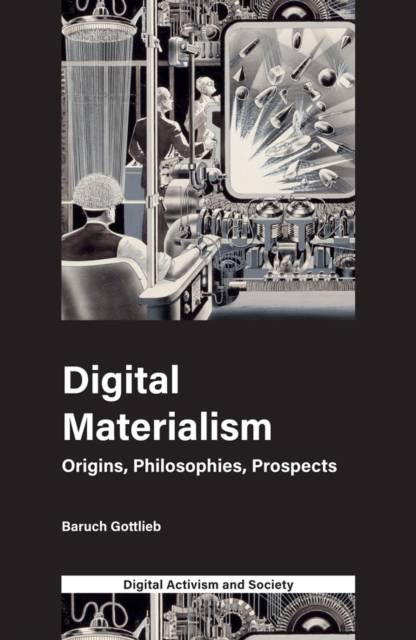
Je cadeautjes zeker op tijd in huis hebben voor de feestdagen? Kom langs in onze winkels en vind het perfecte geschenk!
- Afhalen na 1 uur in een winkel met voorraad
- Gratis thuislevering in België vanaf € 30
- Ruim aanbod met 7 miljoen producten
Je cadeautjes zeker op tijd in huis hebben voor de feestdagen? Kom langs in onze winkels en vind het perfecte geschenk!
- Afhalen na 1 uur in een winkel met voorraad
- Gratis thuislevering in België vanaf € 30
- Ruim aanbod met 7 miljoen producten
Zoeken
€ 109,95
+ 219 punten
Omschrijving
Digital materiality (digimat) proposes a set of basic principles for how we understand the world through digital processes. Digital instruments may seem forbiddingly complex but they are based on simple mechanical principles which operate today on the subatomic scale, creating challenges for conventional human epistemology.
This short book sets out a methodical materialist understanding of digital technologies, where they come from, how they work, and what they do. This analysis starts from the classical materialism of the Greek physicist-philosophers, engages with the humanist and historical materialism of the flourishing of Enlightenment arts and sciences, and extrapolates from post-humanist new materialism informed by quantum physics. There can be no future without a present and that present is always, persistently material.
Readers of this book must grapple with the mattering of digital material, especially the awe-inspiring epistemological schism between the infinitesimal, lightspeed reality of digital data and conventional, empirical human epistemologies which provide the vocabularies and cultural metaphors we must have recourse to in the attempt to discuss, communicate and decypher these phenomena. The obsolescent figure of anthropos (human being) will provide a central foil and subject for this challenge to understand our digital tools and their seemingly irrepressible reproduction. The future of humanity is at stake!
This short book sets out a methodical materialist understanding of digital technologies, where they come from, how they work, and what they do. This analysis starts from the classical materialism of the Greek physicist-philosophers, engages with the humanist and historical materialism of the flourishing of Enlightenment arts and sciences, and extrapolates from post-humanist new materialism informed by quantum physics. There can be no future without a present and that present is always, persistently material.
Readers of this book must grapple with the mattering of digital material, especially the awe-inspiring epistemological schism between the infinitesimal, lightspeed reality of digital data and conventional, empirical human epistemologies which provide the vocabularies and cultural metaphors we must have recourse to in the attempt to discuss, communicate and decypher these phenomena. The obsolescent figure of anthropos (human being) will provide a central foil and subject for this challenge to understand our digital tools and their seemingly irrepressible reproduction. The future of humanity is at stake!
Specificaties
Betrokkenen
- Auteur(s):
- Uitgeverij:
Inhoud
- Aantal bladzijden:
- 216
- Taal:
- Engels
- Reeks:
Eigenschappen
- Productcode (EAN):
- 9781787436695
- Verschijningsdatum:
- 6/02/2018
- Uitvoering:
- Paperback
- Formaat:
- Trade paperback (VS)
- Afmetingen:
- 127 mm x 196 mm
- Gewicht:
- 158 g

Alleen bij Standaard Boekhandel
+ 219 punten op je klantenkaart van Standaard Boekhandel
Beoordelingen
We publiceren alleen reviews die voldoen aan de voorwaarden voor reviews. Bekijk onze voorwaarden voor reviews.









